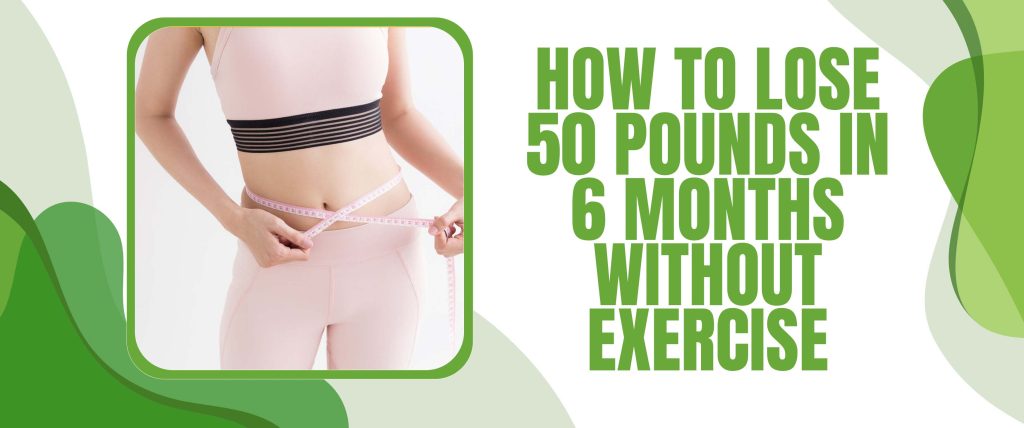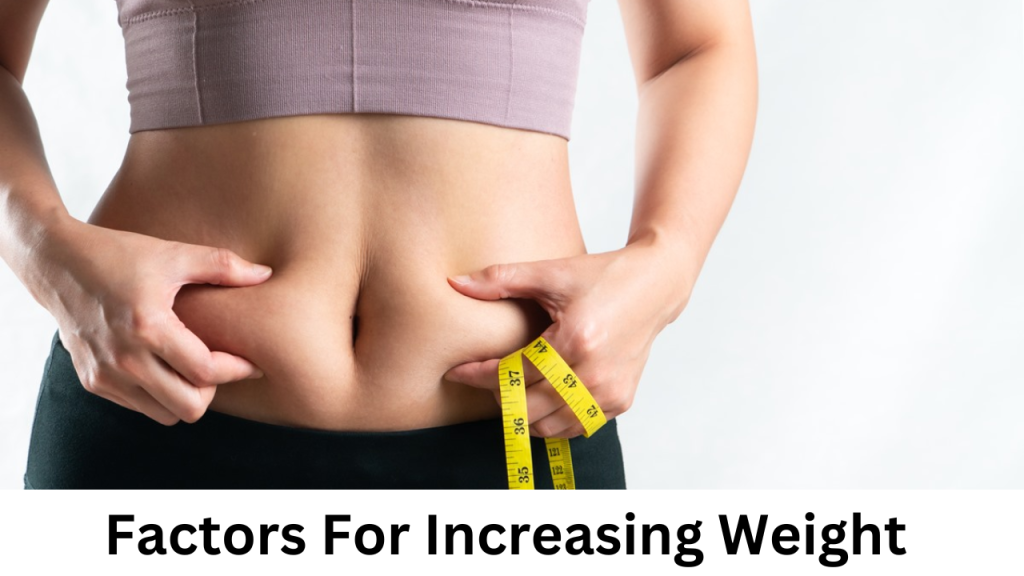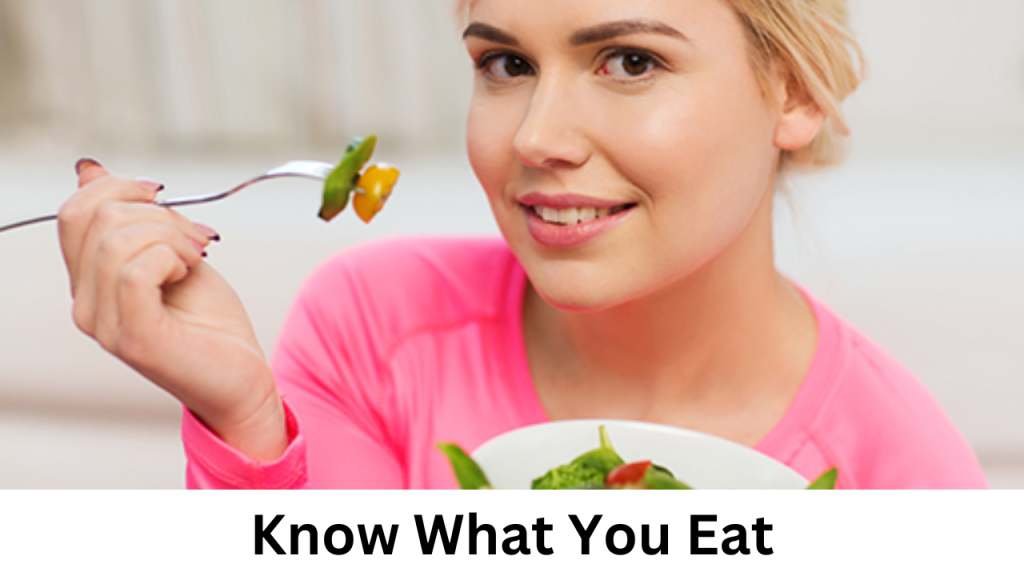|
Getting your Trinity Audio player ready...
|
Reviewed by: Dr. Sadie Wegler
Fact Checked by: Dr. Jordan Wheeler Kincaid

How To Lose 50 Pounds In 6 Months Without Exercise? Read to know more. A sedentary lifestyle is becoming one of the major causes of increasing weight.
9-5 sitting on the same chair at work is now becoming hazardous for our health. Work stress, life stress, career stress, and whatnot all combine to give new focus, which is degrading health stress. Well, the situation is the same for all of us.
But there are certain ways to bring your life trackback in place. Losing pounds is a challenging job. And if you are not an exercise lover, the situation got worse then what to do? Don’t worry; we are here for you.
There are some alternatives to exercise through which you can lose 50 pounds in 6 months without exercise. Still, trying to believe us? Let us take you on the journey of weight loss without introducing equipment.
Do You Need To Stop Fats
If you ask your colleague whether you need to stop eating fat or not for weight loss, the answer will be yes, no doubt about that.
But what if we told you that you do not need to stop fats for weight loss? What would be your reaction? As expected, you will read it as if we have lost our minds but no. for weight loss; you don’t need to stop your fats.
Fats are the protective sheath for your internal organs. It forms a layer over your internal organs and protects them from shock or sudden jerk. The protective layer of fat also maintains the normal temperature, which is apt to conduct physiological reactions.
When there is an absence of glycogen in the body, fat cells go through the oxidation process. Through oxidation, fats break down into simpler compounds. The body’s cells take up these simpler compounds to meet the demand for body energy.
For the oxidation process, there is a need for a surplus supply of oxygen. Fats are an important pillar in their body foundation. Restricting fats for weight loss isn’t an appropriate approach toward health.
Factors For Increasing Weight

It is clear from the above discussion that restricting fats is not an option for weight loss. Then what is the role of fats in increasing weight?
Well, the answer lies within your body itself. The deposition of fat cells in the body depends on numerous factors. Your physical activities to physiological activities all play a role when it comes to the accumulation of extra layers of fats in the body.
Each person is different, so their physical and physiological requirements are. Everything depends on the metabolic rate of the cells, from the amount of sleep to daily calorie intake. Metabolic rate can be defined as the activity of cells towards the body.
The more captive the cells will be, the more the calorie requirement for the body. When there is low body activity, the energy required by the cells will also be low. The condition leads to the accumulation of more calories because of the common requirement of the body.
And in this, if you take more fatty foods, the number of calories accumulated will be more, leading to a considerable amount of weight gain.
Including this, your hormone levels also determine how much fat should accumulate in the body. Because of various reasons, if your hormone levels are disturbed, it will cause uneven distribution of fats in the body.
It may also lead to the accumulation of fats in a single spot leading to a disoriented body structure. Your sleep cycle and your anxiety, stress, and tension all matter when it comes to increasing body weight.
Read more:
- How To Lose 50 Pounds In 7 Months
- How To Lose 50 Pounds In 6 Months
- Best Way To Lose 60 Pounds In 6 Months
How To Lose 50 Pounds In 6 Months Without Exercise
Start With Simple Steps
Knowing the risk of obesity and working towards weight loss is a progressive step. A busy lifestyle and hectic schedule make it difficult to go out and work out in the gym. More than 60% of people need to become more familiar with the use and benefits of different gym equipment.
They need to be made aware of the correct name of the exercise. This makes it more difficult to find the gym and hit the right sets for yourself.
But the gym is not the end solution to the weight loss journey. If you are serious about your health and want to take steps for the betterment now, then you are in the right direction. We have some simple tips that can reduce weight without joining a gym and exercising.
- Start your day early. Waking up in the early morning gives you plenty of time to plan for your day. It will make you relaxed about losing time.
- Do breathing exercises for half an hour daily. Controlling your breath has positive effects on your mind. You can manage your stress levels and keep calm even in stressful situations.
- Replace your elevators with stairs. Move your body to the destinations which can be reached from your feet. Use your energy rather than fuel.
- Walk when you are on a phone call. The simple hack is enough to burn calories and add excitement to your talk.
- Start taking short walking breaks in your office. Stay away from sitting for long hours.
- Bring change to your office meetings. Take walking meetings instead of sitting in a cabin. Be innovative in the way you carry out simple things.
Know What You Eat

We agree with your point that no one checks calories before eating. And yes, you should continue when you are eating a plate of nutritious fruits and vegetables. But you should always check the calories when you are in the middle of a conversation and start opening the nearest chips packet.
Snacking while conversing or killing boredom with potato chips are the easiest activities. But you should be aware when your calorie counter says you exceed your limits.
The number of calories you need according to age and height can be easily calculated. Avoid exceeding the calorie intake limit if your body activity is low.
You can increase your calorie intake if your body activity is more to meet the demands. You can add some tips to your meal and see the changes yourself.
- Start your day with protein. Protein will make you feel fuller for a longer time. You can skip frequent eating with the protein diet in the morning.
- Avoid snacking in the middle of the meals. This will increase your calorie intake without giving proper nutrition to the body.
- Be sure to eat all meals as it can make your body weaker. This will also lead to nutritional lacunas in your body.
- Add colors and variety to your meals. Increase more nutritional value of the meal by adding different vegetables and fruits
- Remember to drink water. Water is necessary to fish out toxins and chemicals from the body.
- Avoid sugary diets and beverages. It only increases your calorie intake with no nutritional gain. It also lowers the metabolic activity of the body.
- Do not starve yourself in the name of restricting calories. Meet the demands of the body with food.
- Your sleep matters a lot. Do not compromise your sleep.
Bottom Line
Your body needs all the nutrients and minerals in the proper amount. Restricting diet may create nutritional lacunas in your body. Do not starve yourself, as a weak body does not meet health criteria. Losing 50 pounds in 6 months without exercise needs proper supervision of your meals. Select your feed wisely. Changing your daily habits will bring positive changes in your health. Be patient and trust the process.
[1]
1. Calories do count. Kinsell, Laurance W. et al. Metabolism – Clinical and Experimental , Volume 13 , Issue 3 , 195 – 204
2. https://www.sciencedaily.com/releases/2008/07/080708080738.htm
3. Jumpertz R, Venti CA, Le DS, et al. Food Label Accuracy of Common Snack Foods. Obesity (Silver Spring, Md). 2013;21(1):164-169. doi:10.1002/oby.20185.
4. Barr SB, Wright JC. Postprandial energy expenditure in whole-food and processed-food meals: implications for daily energy expenditure. Food & Nutrition Research. 2010;54:10.3402/fnr.v54i0.5144. doi:10.3402/fnr.v54i0.5144.
5. Woods SC. The control of food intake: behavioral versus molecular perspectives. Cell Metab. 2009 Jun;9(6):489-98. Review.
6. Klok MD, Jakobsdottir S, Drent ML. The role of leptin and ghrelin in the regulation of food intake and body weight in humans: a review. Obes Rev. 2007 Jan;8(1):21-34. Review.
7. Ramel A, Martinéz A, Kiely M, Morais G, Bandarra NM, Thorsdottir I. Beneficial effects of long-chain n-3 fatty acids included in an energy-restricted diet on insulin resistance in overweight and obese European young adults. Diabetologia. 2008 Jul;51(7):1261-8. Epub 2008 May 20.
8. Pejovic S, Vgontzas AN, Basta M, Tsaoussoglou M, Zoumakis E, Vgontzas A, Bixler EO, Chrousos GP. Leptin and hunger levels in young healthy adults after one night of sleep loss. J Sleep Res. 2010 Dec;19(4):552-8
9. Taheri S, Lin L, Austin D, Young T, Mignot E. Short Sleep Duration Is Associated with Reduced Leptin, Elevated Ghrelin, and Increased Body Mass Index. 2004. PLoS Med 1(3):e62
10. Lally, Phillippa, van Jaarsveld, Cornelia H. M., Potts, Henry W. W., Wardle, Jane. How are habits formed: Modelling habit formation in the real world. European Journal of Social Psychology. Volume 40. Issue 6. John Wiley & Sons, Ltd. 1099-0992. http://dx.doi.org/10.1002/ejsp.674
11. Increased Hydration Can Be Associated with Weight Loss (2016, ncbi.nlm.nih.gov)
12. List of 20 Low Calorie Vegetables for Weight Loss (2021, myfooddata.com)
13. Losing Weight (2020, cdc.gov)
14. Low-carb diet: Can it help you lose weight? (2020, mayoclinic.org)
15. Non-starchy Vegetables (n.d, diabetes.org)
16. Protein (n.d, hsph.harvard.edu)
17. Protein for exercise and recovery (2009, pubmed.ncbi.nlm.nih.gov)
18. Sleep and Circadian Rhythm (2019, hormone.org)
- Laser Hair Removal Costs in the US – Complete Guide - April 13, 2024
- Quinoa for Weight Loss – Effective Tips & Healthy Recipes - April 1, 2024
- WW Sequence Reviews – In-Depth Weight Loss Program Analysis - March 30, 2024
References
| 1 |
1. Calories do count. Kinsell, Laurance W. et al. Metabolism – Clinical and Experimental , Volume 13 , Issue 3 , 195 – 204 2. https://www.sciencedaily.com/releases/2008/07/080708080738.htm 3. Jumpertz R, Venti CA, Le DS, et al. Food Label Accuracy of Common Snack Foods. Obesity (Silver Spring, Md). 2013;21(1):164-169. doi:10.1002/oby.20185. 4. Barr SB, Wright JC. Postprandial energy expenditure in whole-food and processed-food meals: implications for daily energy expenditure. Food & Nutrition Research. 2010;54:10.3402/fnr.v54i0.5144. doi:10.3402/fnr.v54i0.5144. 5. Woods SC. The control of food intake: behavioral versus molecular perspectives. Cell Metab. 2009 Jun;9(6):489-98. Review. 6. Klok MD, Jakobsdottir S, Drent ML. The role of leptin and ghrelin in the regulation of food intake and body weight in humans: a review. Obes Rev. 2007 Jan;8(1):21-34. Review. 7. Ramel A, Martinéz A, Kiely M, Morais G, Bandarra NM, Thorsdottir I. Beneficial effects of long-chain n-3 fatty acids included in an energy-restricted diet on insulin resistance in overweight and obese European young adults. Diabetologia. 2008 Jul;51(7):1261-8. Epub 2008 May 20. 8. Pejovic S, Vgontzas AN, Basta M, Tsaoussoglou M, Zoumakis E, Vgontzas A, Bixler EO, Chrousos GP. Leptin and hunger levels in young healthy adults after one night of sleep loss. J Sleep Res. 2010 Dec;19(4):552-8 9. Taheri S, Lin L, Austin D, Young T, Mignot E. Short Sleep Duration Is Associated with Reduced Leptin, Elevated Ghrelin, and Increased Body Mass Index. 2004. PLoS Med 1(3):e62 10. Lally, Phillippa, van Jaarsveld, Cornelia H. M., Potts, Henry W. W., Wardle, Jane. How are habits formed: Modelling habit formation in the real world. European Journal of Social Psychology. Volume 40. Issue 6. John Wiley & Sons, Ltd. 1099-0992. http://dx.doi.org/10.1002/ejsp.674 11. Increased Hydration Can Be Associated with Weight Loss (2016, ncbi.nlm.nih.gov) 12. List of 20 Low Calorie Vegetables for Weight Loss (2021, myfooddata.com) 13. Losing Weight (2020, cdc.gov) 14. Low-carb diet: Can it help you lose weight? (2020, mayoclinic.org) 15. Non-starchy Vegetables (n.d, diabetes.org) 16. Protein (n.d, hsph.harvard.edu) 17. Protein for exercise and recovery (2009, pubmed.ncbi.nlm.nih.gov) 18. Sleep and Circadian Rhythm (2019, hormone.org) |
|---|
